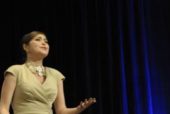Sorry, you aren’t rich enough to be invited to this Stanford summit
Published on: September 23, 2015

A “Philanthropy Innovation Summit” is being held at Stanford University later this month, but you almost certainly can’t attend, unless, that is, you are in the super-exclusive club of “individual and family philanthropists” acceptable to the hosts. In fact, the announcement for the summit, hosted by Stanford’s Center for Philanthropy and Civil Society, explicitly says who can’t attend:
“This is an invitation-only event for individual and family philanthropists. We cannot extend invitations to philanthropic and wealth adviors, [stet] nonprofit leaders or staff, or foundation leaders or staff. If you fit the above criteria and would like to request an invitation, you may contact Karen Lindblom, Associate Director, Stanford PACS, at klindblom@stanford.edu.
Early Bird Rate (through June 23, 2015):
- $2,000 per person ($500 savings!)
Regular Rate (June 24-September 21):
- $2,500 per person
Registration will close on September 21, 2015.”
(What do you suppose will be done with the registration fee? I asked the philanthropy center about this, and about the impetus for the summit but didn’t get a response.)
The idea behind the summit is to give philanthropists space “to convene and discuss their giving in an intimate, non-solicitation environment.” (Because they couldn’t come up with one themselves? How about Bill and Melinda Gateses’ 66,000-square-foot home in Washington state?)
The summit is being hosted by Laura Arrillaga-Andreessen, a philanthropist, entrepreneur, and the founder and board chairman of the center at Stanford that is hosting the summit. She is a graduate of Stanford — with a bachelor’s degree in art history, an MBA and two master’s degrees (in art history and education) — and she is a lecturer in public policy as well as in education. She is also the founder, chairman emeritus and former chairman of SV2 (Silicon Valley Social Venture Fund), a venture philanthropy fund.
Arrillaga-Andreessen is married to Marc Andreessen, the wildly successful Silicon Valley venture capitalist, entrepreneur and engineer. (She calls him her “trophy husband” on the Web site of the Laura Arrillaga-Andreessen Foundation.) She is also the daughter of billionaire John Arrillaga Sr., who is credited with buying fruit orchards in the 1960s and developing the land into what became known as Silicon Valley.
Were you to walk across the Stanford campus, the Arrillaga name would become quickly familiar; there’s the Arrillaga Center for Sports and Recreation and the Arrillaga Family Dining Commons and the Arrillaga Outdoor Education and Recreation Center and, well, you get the idea.
The list of speakers is impressive: Arrillaga-Andreessen is one of them, along with philanthropist Melinda Gates, PayPal co-founder Peter Thiel and Yahoo co-founder Jerry Yang, among others. (Gates, Thiel and Yang would actually seem to be the target audience for this summit, along with billionaires such as Facebook founder and chief executive Mark Zuckerberg and Amazon.com founder and chief executive Jeff Bezos, the owner of The Washington Post and a director of the Bezos Family Foundation, which is run by his parents and supports education initiatives including research, school reform and early childhood learning.)
The lead sponsor of the summit is Cartier (imagine the gift bags), and other sponsors include J.P. Morgan, the Philanthropy Fund of Goldman Sachs, and Schwab Charitable.
Here’s the pitch to those few who will be allowed to attend:
COME BE INSPIRED by information and insights that can only be learned at this event. You will leave with new and actionable ideas and skills to help you as you think about your philanthropy moving forward in topic areas including:
- Seeding Innovation in Philanthropy
- Nexus of Design Thinking and Strategic Philanthropy
- Philanthropreneurship
- Philanthropic Investment for Scientific Advancement
Your time will be divided between conversations, small-group “deep dive” sessions, panel discussions and armchair interviews, as well as visionary speakers to kick off the Summit and an inspiring dinner keynote speaker to close the program — all hosted on Stanford’s beautiful campus. There will be ample time for peer-to-peer discussion and networking during breaks and over meals and cocktails.
If you are wondering what “philanthropreneurship” is, it is a term that came into use about a year ago and refers to, as The Guardian explained in this story,”the idea that the skills which enabled people to make their fortunes are often the ones required to solve apparently intractable problems.”
In other words, billionaires who created computers, software, Internet browsers, retail stores, etc., are the people the country needs to solve societal inequity and other “intractable problems.”
Among the practitioners of philanthropreneurship are Bill and Melinda Gates, whose foundation has invested billions of dollars into controversial school reform efforts. As it has turned out, the skills that enabled Gates to become the world’s wealthiest man and build the planet’s largest philanthropic foundation have not led him to a magic bullet for improving public education. Nor have any of the other fabulously wealthy men and women who have dumped part of their fortunes into school reform efforts that have contributed to the move to privatize public education.
Education is not the only area in which the wealthy believe they can make their mark. Science is another area, and as the summit agenda suggests, is one of the topics up for discussion among attendees. As it turns out, some of the same names behind education reform are also involved in the movement to privatize science, including Gates, former New York City mayor Michael Bloomberg, and the Koch brothers, according to this 2014 story in the New York Times.
While some see these philanthropists as performing a public good, given that there aren’t enough public funds to support science and health research, others worry that science research — and public education — should not be subject to the likes and dislikes of the wealthy or that private philanthropists should be the people who, by leveraging their own fortunes, set the public agenda.
In earlier decades, philanthropists generally donated money to foundations and left it to researchers and subject experts to decide how the cash should be spent, a big difference from today, when many philanthropists put huge amounts of money into their own pet projects. The Times story said that some private funders of science are uninterested in the kind of basic research that leads to fundamental breakthroughs, and that what results is “a jumble of popular, feel-good fields like environmental studies and space exploration.”
In any case, it’s unlikely that the summit attendees will be eating in the Arrillaga Family Dining Commons.
Story From: Stanford University (AP)






